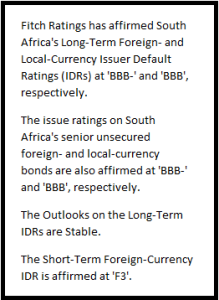Fitch Ratings has reaffirmed South Africa’s outlook as stable with a BBB- rating.
This comes after
Standard & Poor (S&P) decided not to downgrade South Africa to junk status.
According to Fitch, the ‘BBB-’ rating reflects low trend GDP growth, significant fiscal and external deficits, and high debt levels, which are balanced by strong policy institutions, deep local capital markets and a favourable government debt structure.
GDP
Stats SA today announced that South Africa’s gross domestic product (GDP) growth rate was -1.2% in the first quarter of 2016.
The main contributors to the negative GDP growth rate were the mining and quarrying industry and the transport, storage and communication industry.
Mining and quarrying fell by 18.1%, largely as a result of lower production of platinum group metals and iron ore. Transport, storage and communication fell by 2.7%, largely as a result of a decline in land transportation.
The two other industries that contracted in the first quarter were agriculture, forestry and fishing (-6.5%); and electricity, gas and water (-2.8%).
The strongest performer in value added in the first quarter was finance, real estate and business services.
Expenditure on real gross domestic product fell by 0.7% in the first quarter of 2016, however government final consumption expenditure increased by 1%.
Fitch’s research shows that South Africa’s trend GDP growth remains low compared to that of its peers, with five-year average GDP growth at just 2.2% compared to a BBB median of 3.3%.
GDP growth was 1.2% in 2015 and is likely to slow to just 0.7% in 2016 before recovering to 1.5% in 2017. Growth is held back by constrained electricity supply, concerns about the deteriorating investment climate and fractious labour relations.
Political risk
According to Fitch, political risk has increased since the previous rating review in December 2015, although it is not out of line with BBB peers.
“The dismissal of two finance ministers in a week in December, and subsequent tensions between the new finance minister Pravin Gordhan and other parts of the government have raised questions about the commitment of the government to sustained fiscal consolidation and prudent governance of state-owned enterprises,” the global ratings agency said in a statement.
“President Jacob Zuma has become increasingly embattled following the Constitutional Court ruling that he should repay some public funds used to refurbish his Nkandla residence and the Gauteng high court’s ruling that the previous suspension of a 2009 corruption case against Zuma was irrational. Nevertheless, institutions have proved robust,” the statement continued.
“However, Fitch expects the governing African National Congress (ANC) may lose some support in local elections on 3 August 2016. Tensions within the ANC are also increasing ahead of the conference in December 2017 to elect Zuma’s successor as ANC president.”








